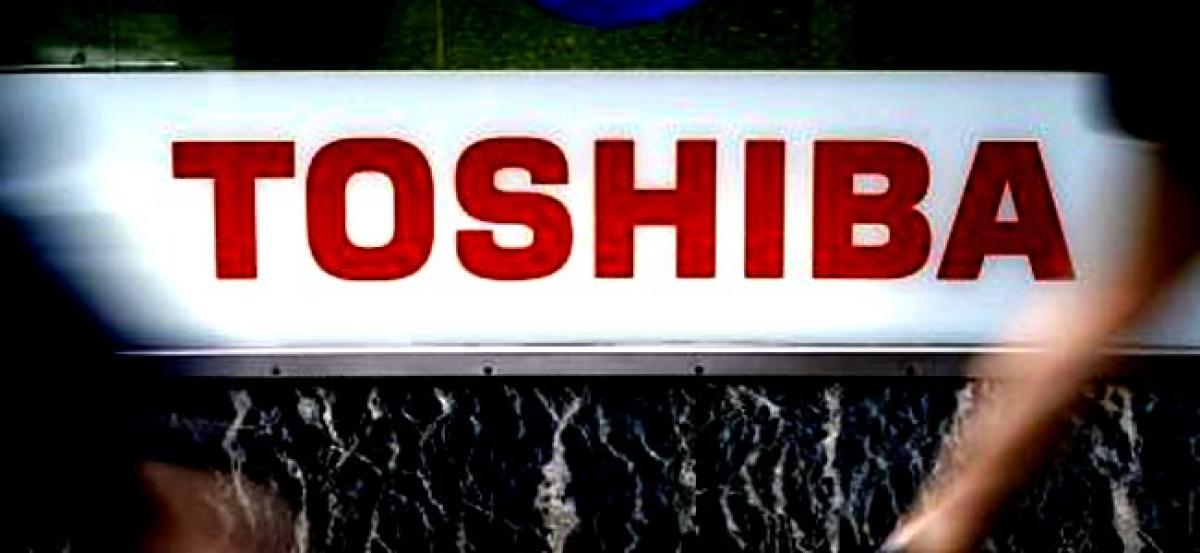Live
- BJP hails Eknath Shinde’s support to accept PM Modi’s decision on Maha CM
- Kolkata needs regional airshed to address AQI deteriorations during winter: Study
- IIM Bangalore concludes International Symposium
- Cozy recipes for winter comfort
- Dhanush Sues Nayanthara Over Unauthorised Use of Film Clips in Netflix Documentary
- Silver Prices Hit One-Month Low in Hyderabad, Dropping to Rs 97,900 per Kg Since October
- Honoring mars and its mysteries
- Opposition leaders create ruckus in Bihar Assembly over Waqf Bill
- World Sindhi forum calls for ending violence against Bangladesh minorities
- PKL Season 11: First half vs Tamil Thalaivas shows our potential, says UP Yoddhas assistant coach
Just In

Shares in Toshiba Corp skidded on Wednesday after the conglomerate said it would book a $6.3 billion hit to its U.S. nuclear unit and may sell a majority stake in its prized flash-memory chip unit as it scrambles for cash to stay in business.
TOKYO: Shares in Toshiba Corp skidded on Wednesday after the conglomerate said it would book a $6.3 billion hit to its U.S. nuclear unit and may sell a majority stake in its prized flash-memory chip unit as it scrambles for cash to stay in business.
Facing a March 27 deadline to avoid a delisting, Chief Executive Satoshi Tsunakawa said he would consider selling most, even all, of the chips business - a turnaround from the conglomerate's previous stance that it would sell only about 20 percent.
The change of direction has prompted investors to question whether the company would have a long-term future without control of the unit and could well shake up the bevy of suitors interested in a piece of the world's biggest NAND chip producer after Samsung Electronics Co Ltd.
"Usually in a corporate turnaround plan, the company would keep its most competitive business after selling non-performing businesses," said Masayuki Kubota, chief strategist at Rakuten Securities.
"This turnaround plan gives no hope for Toshiba's future," he said.
Taiwan's Foxconn, formally known as Hon Hai Precision Industry Co Ltd, is among the companies and funds that were bidding for the smaller stake, a source with direct knowledge of the offer said, declining to be identified because he is not authorized to talk to the media.
Foxconn officials were not immediately available to comment.
Other bidders include SK Hynix Inc, Micron Technology Inc and private equity firm Bain Capital, sources have said previously.
Foxconn, which last year bought a controlling stake in Japanese panel maker Sharp Corp (6753.T), may find it easier than other corporate bidders to buy a large stake as it is not a major memory chip maker and could avoid any lengthy anti-trust review.
WAIVER FAVOR
Toshiba's new openness towards selling more of its chips business comes as the beleaguered conglomerate failed to deliver audited third-quarter earnings as scheduled on Tuesday, instead saying it needed more time to look at potential problems at its Westinghouse division. The expected $6 billion writedown will also wipe out shareholders' equity.
It has been granted an extension until March 14 to submit audited figures but would face a delisting if it still failed to file within eight business days after that.
Toshiba shares slid to end down 9 percent, giving it a market value of 889 billion yen ($7.8 billion), less than half its value in mid-December. Just under a decade ago, the firm was worth almost 5 trillion yen.
At a meeting with its creditors on Wednesday, Toshiba executives asked for an extension of a waiver for a loan covenant violation until the end of March, financial sources said, declining to be identified as they were not authorized to speak to the media on the matter.
Cuts to credit ratings after Toshiba warned in December of a large writedown put it in violation of one loan covenant, which could prompt lenders to call in loans early.
Toshiba's loans from banks and insurers stood at about 800 billion yen ($7 billion) as of end-September, a financial source has said. Sumitomo Mitsui Banking Corp (8316.T) and Mizuho Bank (8411.T) are its biggest creditors.
While the two lenders and the state-backed Development Bank of Japan Inc have so far expressed support for Toshiba, other creditors will need more convincing before they back Toshiba further, sources familiar with the matter have said.
"Toshiba can restore its balance sheet health after selling a majority holding in its memory chip business. But the problem is, how will it make money after that?" said a senior loan official at one of the creditors.
Potential investors in Toshiba may also need to heed Japanese government concern about the future of a company its sees as strategically important.
"Toshiba's flash memory business is an significant part of Japan's economic growth strategy and its domestic nuclear business is important for reactor decommissioning and the clean up of contaminated water," Japan's chief government spokesman, Yoshihide Suga, said at a regular briefing on Wednesday.

© 2024 Hyderabad Media House Limited/The Hans India. All rights reserved. Powered by hocalwire.com







